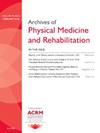Intentional Inclusion of Navigator Scientists to Enhance the Relevance and Sustainability of Peer Support Interventions
IF 3.6
2区 医学
Q1 REHABILITATION
Archives of physical medicine and rehabilitation
Pub Date : 2025-05-01
DOI:10.1016/j.apmr.2025.03.007
引用次数: 0
Abstract
We are approaching a quarter of a century of enshrined civil rights legislation that mandates full and equal participation of people with disabilities across all aspects of society. Yet, the 61 million Americans living with disabilities continue to experience well-documented barriers to health, healthcare, and community living at the nexus of disability status, social determinants of health and intersectional minoritized identities. In our increasingly interconnected world, there is a critical need to diversify our approach to science and intervention to break down systemic barriers to care and community participation. mENTER is a 12-month mHealth-enabled peer support intervention aimed at people with acquired physical disabilities transitioning from in-patient rehabilitation to independent living. This evidence-informed behavioral intervention was conceptualized using community-based participatory approaches between academic rehabilitation researchers, disability rights advocates at a Center for Independent Living, and a Medicaid managed care organization. As the project has evolved so too has our approach to transdisciplinary science and the ways to intentionally increase engagement of people with lived experience to promote both program relevance and the quality of the science. Specifically, we created a "navigator scientist" approach that embeds people with disabilities as co-designers, interventionists, and evaluators of the mENTER training, intervention, and technology infrastructure to support this complex behavioral intervention. In this presentation, we will describe the strategies that we have used to embed navigator scientists in our transdisciplinary team that includes rehabilitation researchers, behavioralists and implementation scientists, and computer scientists. We will emphasize strengths, challenges, and creative possibilities inherent in this approach.
有意纳入导航科学家,以提高同伴支持干预的相关性和可持续性
我们即将迎来四分之一个世纪的庄严民权立法,它要求残疾人充分和平等地参与社会的各个方面。然而,6100万美国残疾人继续在健康、医疗保健和社区生活方面经历着有据可查的障碍,这些障碍涉及残疾状况、健康的社会决定因素和交叉的少数民族身份。在我们日益相互联系的世界中,迫切需要使我们的科学和干预方法多样化,以打破妨碍护理和社区参与的系统性障碍。mENTER是一项为期12个月的移动健康同伴支持干预,旨在帮助获得性肢体残疾患者从住院康复过渡到独立生活。这种循证行为干预是由学术康复研究人员、独立生活中心的残疾人权利倡导者和医疗补助管理护理组织之间的社区参与式方法概念化的。随着项目的发展,我们的跨学科科学方法也在不断发展,我们有意增加有生活经验的人的参与,以提高项目的相关性和科学的质量。具体来说,我们创造了一种“导航科学家”的方法,将残疾人嵌入到mENTER培训、干预和技术基础设施的共同设计者、干预者和评估者中,以支持这种复杂的行为干预。在这次演讲中,我们将描述我们用来将导航科学家嵌入我们的跨学科团队的策略,该团队包括康复研究人员,行为学家和实施科学家以及计算机科学家。我们将强调这种方法固有的优势、挑战和创造性可能性。
本文章由计算机程序翻译,如有差异,请以英文原文为准。
求助全文
约1分钟内获得全文
求助全文
来源期刊
CiteScore
6.20
自引率
4.70%
发文量
495
审稿时长
38 days
期刊介绍:
The Archives of Physical Medicine and Rehabilitation publishes original, peer-reviewed research and clinical reports on important trends and developments in physical medicine and rehabilitation and related fields. This international journal brings researchers and clinicians authoritative information on the therapeutic utilization of physical, behavioral and pharmaceutical agents in providing comprehensive care for individuals with chronic illness and disabilities.
Archives began publication in 1920, publishes monthly, and is the official journal of the American Congress of Rehabilitation Medicine. Its papers are cited more often than any other rehabilitation journal.

 求助内容:
求助内容: 应助结果提醒方式:
应助结果提醒方式:


